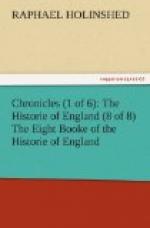and all other ancient Greeke and Latine writers doo
affirme to haue had their begining in Britaine, and
to haue bin brought from thence into Gallia, insomuch
that when there arose any doubt in that countrie touching
any point of their discipline, they did repaire to
be resolued therein into Britaine, where, speciallie
in the Ile of Anglesey (as Humfrey Llhoyd witnesseth)
they [Sidenote: Anti. lib. 5. Annius
super eundem. De bello Gallico. 6.] made
their principall abode. Touching their vsages
many things are written by Aristotle, Socion, Plinie,
Laertius, Bodinus, and others: which I will gather
in briefe, and set downe as followeth. They had
(as Caesar saith) the charge of common & priuate sacrifices,
the discussing of points of religion, the bringing
vp of youth, the determining of matters in variance
with full power to interdict so manie from the sacrifice
of their gods and the companie of men, as disobeied
[Sidenote: Hist. an. lib. 1.] their award.
Polydore affirmeth, how they taught, that mens soules
could not die, but departed from one bodie to another,
and that to the intent [Sidenote: De diui.
lib. 1.] to make men valiant and drealesse of
death. Tullie writeth, that partlie by tokens,
and partlie by surmises, they would foretell things
to come. And by the report of Hector Boetius,
some of them were not ignorant of the immortalitie
of the one and euerlasting God. All these [Sidenote:
Hist. Scoti. li. 2. De migr. gen. lib.
2. Marcellinus.] things they had written in
the Greeke toong, insomuch that Wolf. Lazius
(vpon the report of Marcellinus) declareth how the
Greeke letters were first brought to Athens by Timagenes
from the Druides. And herevpon it commeth also
to passe, that the British toong hath in it remaining
at this day some smacke of the Greeke. Among
other abuses of the Druides, they had (according to
Diodorus) one custome to kill men, and by the falling,
bleeding, and dismembring of them, to diuine of things
to come: for the which and other wicked practises,
their sect was first condemned for abhominable (as
some haue written) and dissolued in Gallia (as Auentinus
witnesseth) by Tiberius and Claudius the emperours;
and [Sidenote: Anna. Boiorum. lib.
22.] lastlie abolished here in Britaine (by the report
of Caius) when the gospell of Christ by the preaching
of Fugatius and Damianus was receiued [Sidenote:
De ant. Cant.] among the Britaines, vnder
Lucius king of Britaine, about the yeare of our sauior,
179.
[Sidenote: BARDUS THE SONNE OF DRUIS. Berosus ant. lib. 2. Annius in commen. super eundem. Ant. Cant li. 1. script. Britan. cent. 1. Nonnius. Marcel. Strabo. Diodor. Sicul. lib. 6. Carol. Stepha. in dict. hist. Bale. Iohn Prise.] Bardus the sonne of Druis succeeded his father in the kingdome of Celtica, and was the fift king ouer the Celtes and Samotheans, amongst whom he was highlie




